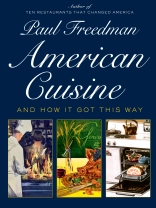Paul Freedman’s gorgeously illustrated history is “an epic quest to locate the roots of American foodways and follow changing tastes through the decades, a search that takes [Freedman] straight to the heart of American identity” (William Grimes).
Hailed as a “grand theory of the American appetite” (Rien Fertel, Wall Street Journal), food historian Paul Freedman’s American Cuisine demonstrates that there is an exuberant, diverse, if not always coherent, American cuisine that reflects the history of the nation itself. Combining historical rigor and culinary passion, Freedman underscores three recurrent themes—regionality, standardization, and variety—that shape a “captivating history” (Drew Tewksbury, Los Angeles Times) of American culinary habits from post-colonial days to the present. The book is also filled with anecdotes that will delight food lovers:
· how dry cereal was created by William Kellogg for people with digestive problems;
· that Chicken Parmesan is actually an American invention;
· and that Florida Key-Lime Pie, based on a recipe developed by Borden’s condensed milk, goes back only to the 1940s.
A new standard in culinary history, American Cuisine is an “an essential book” (Jacques Pepin) that sheds fascinating light on a past most of us thought we never had.
Om författaren
Paul Freedman is a history professor at Yale University. The author of the highly acclaimed Ten Restaurants That Changed America, Freedman lives in Pelham, New York.












